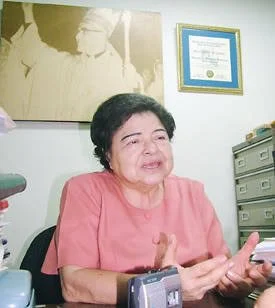Maria Julia Hernandez, 1991
How difficult would it be to stand firm against the forces of governmental power and ruthless violence, when the only wind at your back is your faith in God and the hope for justice. That is what Maria Julia Hernandez, the 1991 Pacem Terris Peace and Freedom winner, did for close to 30 years.
She had been teaching law when in 1978 her life took on a new purpose. Oscar Romero, the Archbishop of El Salvador, asked Hernandez to help with a human rights commission he had established to investigate torture and deaths that were happening in poor areas around El Salvador.
She knew her work documenting the torture and deaths of peasants during the El Salvador civil war would put her in grave danger. There was further evidence of this danger two years later when Archbishop Romero was murdered while saying Mass, after calling for the peasant killings to stop.
But Hernandez was not deterred. Romero’s successor, Arturo Rivera y Damas, asked her to set up Tutela Legal (Legal Protection) and continue her work. As reported in her obituary in The Guardian: “Armed only with her Christian faith and a remarkable tenacity, Hernández visited massacre sites, interviewed witnesses and compiled testimonies.”
Hernandez did have her own fatalistic prayer she would say before embarking on a new investigation of killings by organized death squads. “Well, God, I’ll either see you today or you’ll give me more time to keep fighting.”
While I did not know Prof. Hernandez, I feel I have some understanding of the environment in which she worked. In December 1990, just before she received her Pacem in Terris award, my wife and I were in El Salvador adopting our first child. The El Salvador we saw was a country of stunning beauty and staggering poverty. A country on edge after years of civil war, with periodic gun fire echoing in hills near the Sheraton when we stayed.
The capital city, San Salvador, displayed bright shopping centers, restaurants, and crowded slums. Rural roads were lined with squatters—part-time laborers and coffee harvesters—existing in shacks made of old pallets covered with scraps of salvaged tin and plastic. The countryside was lush with the start of the rainy season. And wherever we traveled there were military troops on foot patrol, at check points, or on trucks, with hands on their guns, alert and ready.
With little communication in remote areas, it was easy to imagine how the killing of a few, or a few hundred, suspected sympathizers of the opposition, could go unreported.
It was the job of Hernandez and Tutela Legal to make sure that didn’t happen. As the Catholic Messenger reported when announcing Hernandez’s award, Tutela Legal “does independent investigations when citizens complain of government abuse or suppression of rights. In recent weeks, Tutela Legal investigated an alleged massacre of civilians by government troops in the countryside near San Salvador. El Salvador has had a civil war for more than a decade. During that period, the military and its allies among dominant families have been regularly accused of committing or tolerating the killing of people who help the poor become organized. Church workers are regularly threatened and killed.”
One of the most challenging efforts undertaken by Hernandez was documenting the story of Rufina Amaya Márquez, the sole surviving witness to the December 1981 massacre of 794 people in her remote village, El Mozote. Márquez had escaped notice in the mayhem as army members separated men, women, and children in the search for leftist rebels. This brave woman eventually searched out Hernandez to tell her story.
The Economist related the story this way when they wrote Hernandez’s obituary. “Hernández took down all the information. She was a sympathetic sort, who in her old-fashioned print dresses looked much like a priest’s housekeeper; but she had been a professor of law at the University of Central America in San Salvador and would fix those who tried to deceive her with a stony, intellectual stare. Since 1978, as El Salvador slid into disorder, she had been compiling for the archdiocese a book of the dead. These were the corpses left by right-wing death squads in the city streets most nights, their faces dissolved by battery acid and their backs or chests scored with the tags of their killers. Her colleagues would take photographs, and relatives of the missing would come to her office to leaf through the portfolio in the hope, or fear, of finding them. But Rufina Amaya Márquez’s story of what happened in El Mozote was an atrocity beyond any of this.”
The Economist article continues: “For years, with a lawyer’s thoroughness and steely determination, Miss Hernández amassed the evidence. The government would not help; it denied that anything had happened and dismissed Tutela Legal as a guerrilla front. In the U.S., the Reagan administration, intent on stamping out communist infection, agreed that Miss Hernández was a troublemaker. She was undeterred. In 1989 six Jesuits were shot dead at her old university; Tutela Legal did the first investigation and found that the army had ordered the shootings. In 1991 her office published the first investigation into village massacre in El Mozote, including the names of all the dead.”
It would be 20 years later, several years after Hernandez passing, that the government of El Salvador finally apologized for the massacre.
Maria Julia Hernandez never lived to see true peace and justice come to her country. While the civil war did end, and elections are held regularly, the country became a wash in gang violence, much of it taken out on the poorest of those living in El Salvador. But Hernandez does leave a legacy of bravery, of telling truth to power, of nonviolence, and undeterred efforts toward reconciliation and understanding that are a model for all in the world.
by Rodney J. Gasch

